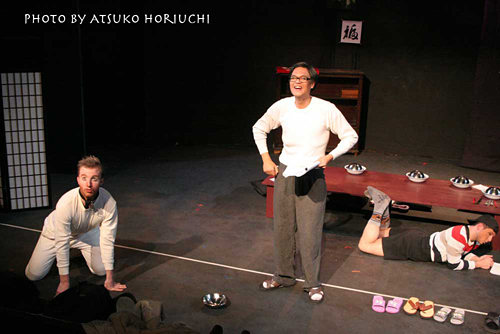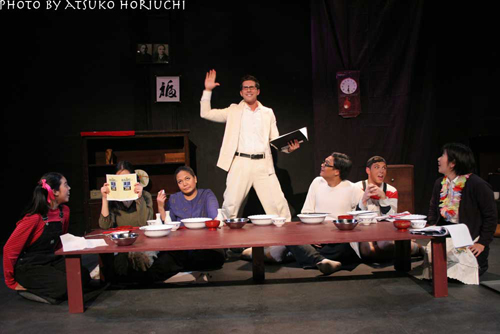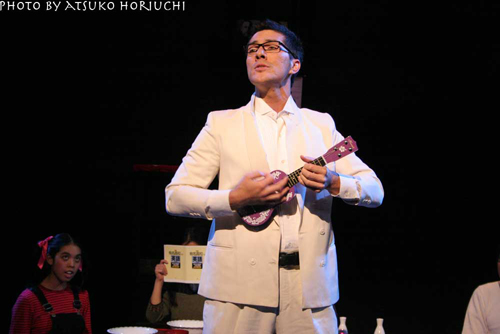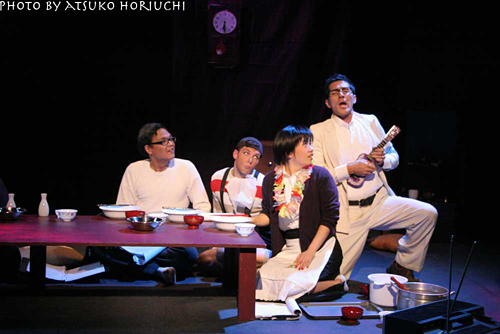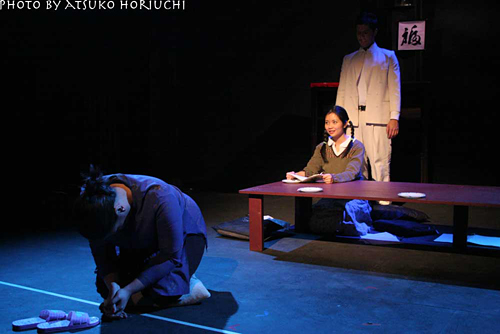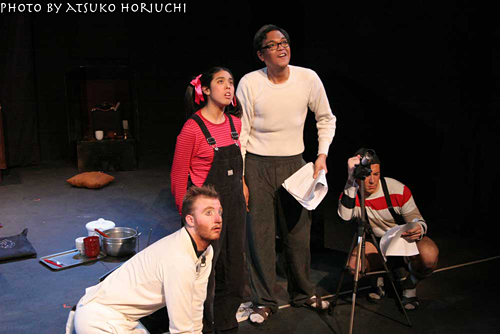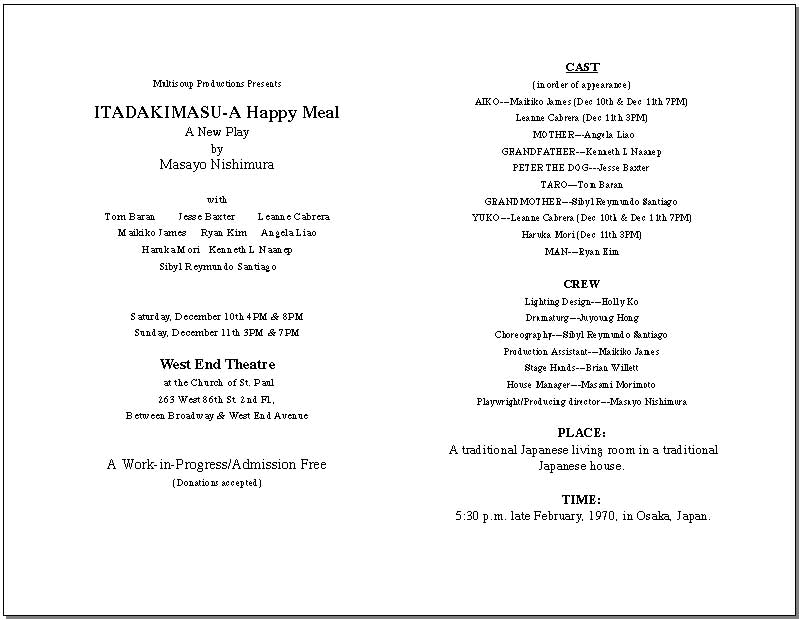Spring is about to bloom in 1970, Osaka, Japan. As 6 PM approaches, the (lastname) family of GRANDFATHER-- 78, GRANDMOTHER-- 74, MOTHER-- 38, YUKO-- 13, AIKO-- 9, TARO—7, and the family dog, PETER start their very happy family dinner. An unexpected visitor in white arrives—and he brought his appetite. Hiding behind sunglasses and claims of being a Food Coordinator, he samples his way through the family's courses and their lives, saying that they must prove themselves on culinary and domestic fronts if they want to be lucky enough to get sent to Hawaii as winners in the " Happy Family Dinner Contest '70." Though it's a contest the family didn't know they were contestants for, they compete vigorously.
The family gives a hard sell to the Man with a bottomless stomach. He eats them up as Grandfather paints a picture of himself as a happy-go-lucky gent who credits his longevity to his taste for Mother's succulent cuisine. The Grandmother details for the visitor how she sees her strength in being a survivor of an abusive mother-in-law and overcoming obstacles to become the backbone of the household. Mother in turn portrays herself to the Man as a sweet, caring role model and all-around supermom. Running a tight ship, Mother presents the children she raised without a father, billing Yuko as an honor student who loves nothing more than to study day and night, Aiko as a piano wonder, and Taro as a prodigy.
After his gastronomical interview is complete, the Man breaks into song and dance as he informs the family that they are indeed aloha-bound. Bowled over, the family joins in the boisterous celebrations. While everyone is distracted, the Man perpetrates a little thievery around the house, picking their pockets as they dance. Peter smells a rat and attacks, causing the Man's disguise to come off. After seeing though his persona, Mother tells her children that here is the father they have barely known, gone for seven years. While the family is rejoicing the reunion with Father, Mother prepares her just desserts. Force feeding Father his last supper, a frozen plate saved for the duration of his absence, he responds with violence and barely escapes.
As the dinner hour passes and 7 p.m. falls upon the family, the TV schedule is consulted and they settle into their evening. Mother, Aiko, and Taro help clean up in the kitchen, leaving Grandmother and Grandfather to talk about the night's events. They also recall an evening about seven years ago when Father was drunk, Mother was beaten so severely she was sent to the hospital, and Grandfather delivered a blow to father with the very same wall clock that remains in their living room today. Yuko, entering her teenage years and struggling for acceptance, recalls how she witnessed all the events and how she lives in a quiet devotion to her father. That grim evening, the elders buried Father under the porch, the same spot that Peter was found. After Grandfather, Grandmother and Yuko fall in sleep, the Man returns to watch Mother singing in the kitchen. While howling at the moon, Peter, from the porch, tells us that his dog's life is "not bad."
Itadakimasu - A Happy Meal is an absurd physical comedy interspersed with pathos. It depicts the life of a family during the golden age of Japan's superb economic recovery from WWII. The entire family drama takes place at the family’s dinner table in their traditional Japanese-style living room. The family consists of Grandfather, Grandmother, Mother, three children, and their family dog. Father is mysteriously missing. The family seems perfectly happy, caring for each other and eagerly awaiting Mother’s exquisite homemade cooking. While they are eating and cheerfully conversing, an unexpected visitor suddenly arrives and explains to the family that they are eligible for a dream vacation to Hawaii. As the play progresses, it soon becomes clear that every member of this close-knit Japanese family hides a surprisingly dark secret under a deceptively happy face.
I hope my audience experiences the internal complexities of individual family members as they sit for two hours at their dinner table. Itadakimasu - A Happy Meal re-examines human nature, challenges the stereotype of the model family, and explores the true meaning of the word "happiness."
